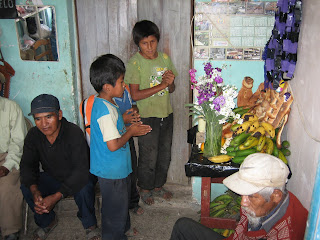His results also showed that farmers with less land looked for more opportunities for courses about better farming techniques. Juan Carlos explained that farmers with less land need to be more efficient to support their families, and so they seek out information.
This research gives us information that helps us develop more effective extension strategies. Gracias, Juan Carlos!

Photo: Director of the College Father Freddy poses with the morning graduate Juan Carlos Ballivian.
In the afternoon, Carmen Pampa native Lucila Cama presented the results from her project looking at the production of stevia, a plant that serves as a natural sweetener. She showed that using an organic foliar fertilizar called biol lead to increased production, and more profitability. Bienvenida a la familia de titulados, Lucila!

Photo: (L to R) Research advisor Manuel Chino, René Villca, College Director Father Freddy,new grad Lucila Cama, Desiderio Flores and Agronomy Director José Luis Beltrán (photo from Sarah Mechtenberg).










